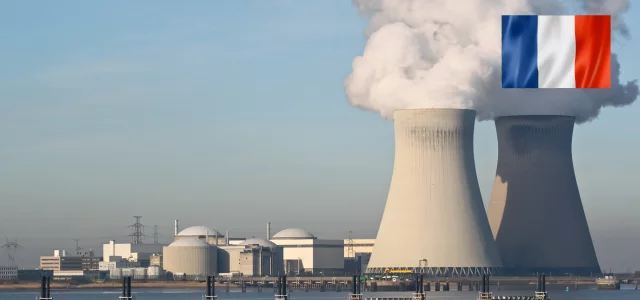
This article originally ran on Forbes.com on May 9, 2025. All rights reserved.
Daniel B. Markind is a Forbes.com energy column contributor. The views expressed in this article are not to be associated with the views of Flaster Greenberg PC.
The global rise of Artificial Intelligence (AI), the proliferation of data centers, urbanization in emerging markets, and increasingly widespread electrification are all major factors driving the insatiable demand for electricity world-wide. Meanwhile, the world’s focus on zero-emission energy in response to climate change has placed a premium on developing and maintaining safe and reliable nuclear energy virtually everywhere, which can provide a steady baseload of much needed non-fossil fuel energy throughout the world. Indeed, large energy dependent companies like Microsoft and Google are even beginning to purchase their own nuclear reactors, while European nations like Germany, Austria, and Switzerland shutter their own, existing ones.
Unique among Western nations, France remained committed to producing nuclear energy while the rest of the world mothballed many nuclear facilities in reaction to disasters like Three Mile Island, Chernobyl, and Fukushima. According to the World Nuclear Association, France now produces approximately 70% of its energy from nuclear sources. As the world becomes more concerned with reducing dependence on fossil fuels, France would seem to be among the best-positioned nations to lead in energy production while decreasing carbon emissions. Unfortunately, this is not the case.
The reality is that energy planning and supply in France have had a spotty and complicated record over the last several years. This, in turn, raises serious questions about Paris’s ability to lead Europe into the new energy age, despite President Emmanuel Macron’s apparent aspirations to position France as Europe’s carbon-free energy frontrunner.
2022 was a watershed year – just as the Russian invasion of Ukraine began, threatening to trigger energy supply emergencies for many European countries, half of France’s nuclear power plants were offline. For the first time in decades, France was forced to become a net importer of energy, at a time when its neighbors were struggling to obtain power themselves without depending on Moscow to keep the lights and heat on. To make matters worse, the French government decided the time was right to start nationalizing the country’s nuclear power operator, Électricité de France (EDF), thereby angering the company’s employee shareholders in the process.
The government also decided to try to shield French consumers from rising energy costs, forcing EDF to buy energy at high market prices and distribute it at a loss. This messy scenario resulted in EDF suing its own government for some €8.3 billion in losses, with its employee shareholders threatening to sue for more.
2022 was also the year that Macron, then a candidate for his second presidential term, called for a “nuclear renaissance” to include the build-out of up to 14 new nuclear reactors as a key step in getting away from the use of fossil fuels. His call was actually quite late in coming – in the wake of the 2011 Fukushima nuclear accident in Japan, France had put new nuclear projects on hold. Meanwhile, its fleet of existing reactors was aging out and needing more frequent maintenance. Further, inspections and repairs had lagged behind schedule due to the prolonged wave of COVID shutdowns. By 2021, the mean age of France’s 56 reactors was 36.1 years. The government had been planning to conduct the requisite inspections and repairs to extend the life of select reactors in the fleet to 50 years when stress corrosion issues were found in several of the reactors, necessitating shutdowns. Some of France’s reactors still remain offline.
In 2024, EDF finally opened a new type of reactor in Flamanville, on the Normandy coast, after massive cost overruns (€13.2 billion/US$14.6 billion – around four times the €3.3 billion initially budgeted) and 12 years of delays. However, the reactor shut itself down on its second day of operation. After completely restructuring its core, EDF eventually reconnected it to the grid in April 2025.
While France has remained committed to nuclear power, it is not managing to walk its own walk as far as costs and delivery are concerned. The example of the Flamanville reactor speaks for itself. At the same time, Paris has contradicted itself repeatedly when it comes to integrating renewables into its energy framework. For instance, in 2023, France enacted a green energy law requiring listed companies to consult their shareholders on their climate strategies — only to backtrack on many of its provisions within months in a demonstration of poor planning, ill-considered policymaking, and an overall lack of practical and strategic vision.
The constant back-and-forth, delays, and false starts, along with the massive cost overruns associated with nuclear construction, have rendered French energy policy incoherent and placed a burden on its neighbors. This became glaringly evident on April 28th, when a massive power blackout hit all of Spain and Portugal, as well as parts of France and neighboring countries. While the immediate cause of the outage is still under investigation, the fragility of Spain’s grid and its limited connectivity to France were major contributors. Spain’s Energy Minister, Teresa Ribera, has previously highlighted the enormous difficulties in improving cross-border energy links with France, which continue to hinder Spain’s integration into the broader European energy market, leaving that country with limited options for electricity imports from France during times of crisis.
The recent blackout underscores the challenges of integrating intermittent renewable sources, which typically introduce volatility into power grids through significant fluctuations in production and transmission. While France, with its nuclear baseload, fared better during the blackout than its Iberian neighbors, the blackout once again raised the issue of how Paris will generate power reliably and cost-effectively in the future.
Despite his aspirations, France’s inconsistent energy policy and budgetary constraints limit Macron’s ability to maneuver internationally, and leave him little choice but to court Qatari investments and even seek accommodations with Iran.
What’s more, without a coherent, long-term energy policy that generates sufficient power, France is actually creating an energy dilemma for itself that serves as fertile political ground for the home-grown populist right National Rally, which has been gaining momentum among French voters and nearly won the most recent national elections before a court barred the party’s leader, Marine Le Pen, from running for the presidency in April 2027.
For France as a whole, all of this disarray and lack of cogent planning reflects the remarkable squandering of a once-commanding energy advantage. France’s long-time leadership in nuclear energy should have given it a winning hand internationally. Instead, although its President talks a big game, its leaders appear unable to chart a clear course, endangering its overall leadership of the EU on energy policy in the process.
- Shareholder
Shareholder Daniel B. Markind serves as the lead of the Aviation Law Industry Group and Government Relations Practice Group.
He has more than 40 years of experience as an airport, real estate, energy, and corporate transactional ...


